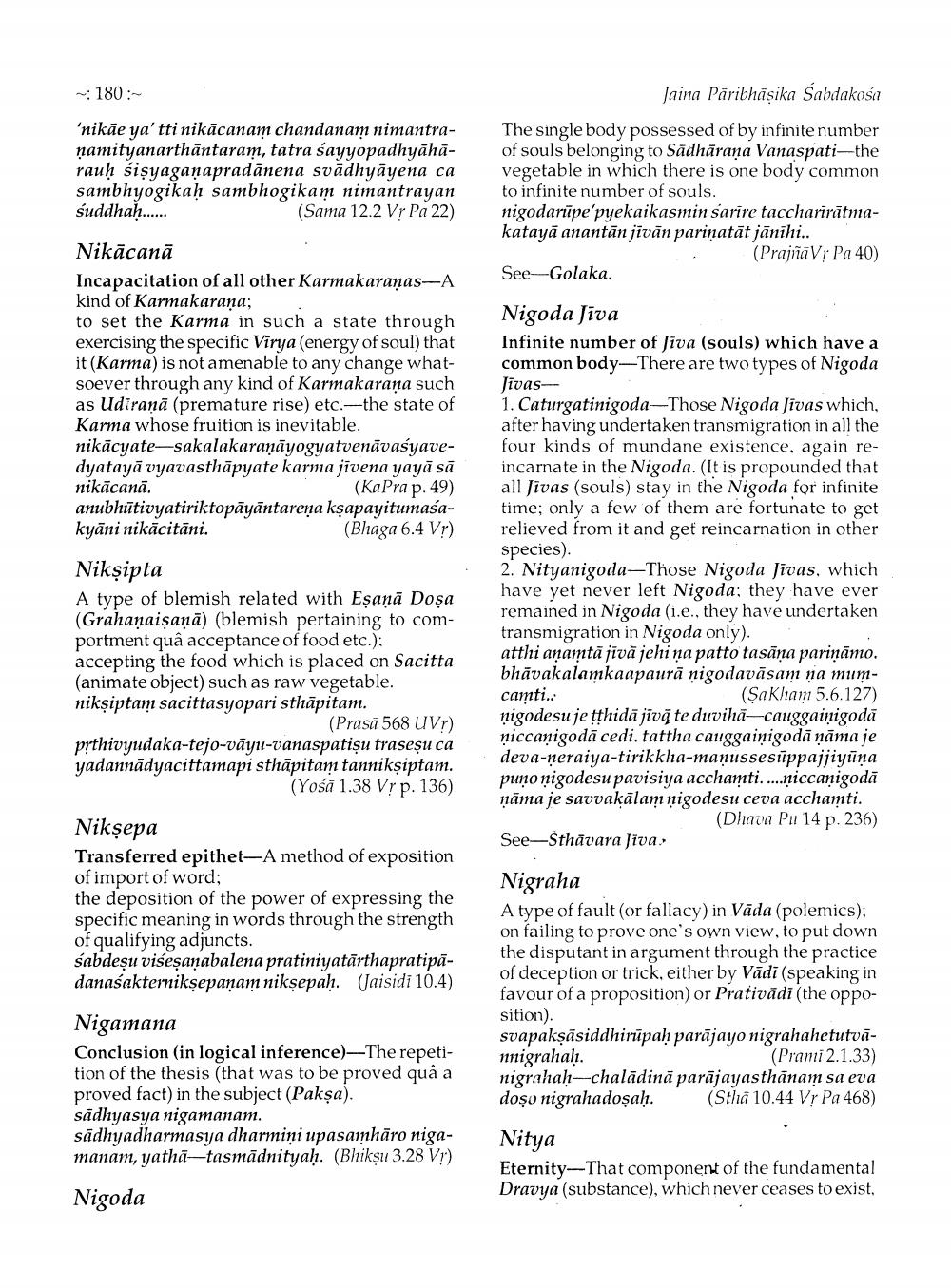________________
180 :
Jaina Pāribhāșika Sabdakosa
'nikāe ya'tti nikācanam chandanam nimantranamityanarthāntaram, tatra sayyopadhyāhārauḥ śişyaganapradānena svādhyāyena ca sambhyogikah sambhogikam nimantrayan suddhaḥ..
(Sama 12.2 Vr Pa 22)
The single body possessed of by infinite number of souls belonging to Sādhārana Vanaspati-the vegetable in which there is one body common to infinite number of souls. nigodarüpe'pyekaikasmin sarire taccharirātmakatayā anantān jīvān parinatāt jānihi..
(Praj7aV Pa 40) See--Golaka.
Nikācanā Incapacitation of all other Karmakaranas-A kind of Karmakarana; to set the Karma in such a state through exercising the specific Vīrya (energy of soul) that it (Karma) is not amenable to any change whatsoever through any kind of Karmakarana such as Udiraņā (premature rise) etc.--the state of Karma whose fruition is inevitable. nikācyate-sakalakaraņāyogyatvenāvasyavedyatayā vyavasthāpyate karma jīvena yayā sā nikācanā.
(KaPra p. 49) anubhūtivyatiriktopāyāntarena kşapayitumasakyāni nikācitāni.
(Bhaga 6.4 Vr)
Nikṣipta A type of blemish related with Eşanā Dosa (Grahanaisanā) (blemish pertaining to comportment quâ acceptance of food etc.); accepting the food which is placed on Sacitta (animate object) such as raw vegetable. niksiptam sacittasyopari sthāpitam.
(Prasā 568 UVr) pythivyudaka-tejo-vāyu-vanaspatiņu traseșu ca yadannādyacittamapi sthāpitam tanniksiptam.
(Yośā 1.38 V, p. 136)
Nigoda Jiva Infinite number of Jiva (souls) which have a common body-There are two types of Nigoda Jivas 1. Caturgatinigoda-Those Nigoda Jivas which, after having undertaken transmigration in all the four kinds of mundane existence, again reincarnate in the Nigoda. (It is propounded that all Jivas (souls) stay in the Nigoda for infinite time; only a few of them are fortunate to get relieved from it and get reincarnation in other species). 2. Nityanigoda—Those Nigoda Jivas, which have yet never left Nigoda; they have ever remained in Nigoda (i.e., they have undertaken transmigration in Nigoda only). atthi anaitā jīvā jehi na patto tasāna parināmo. bhāvakalamkaapaurā nigodavāsam na mumcamti..
(Saklam 5.6.127) nigodesu je tthidā jīvā te duviha-cauggainigoda niccanigodā cedi. tattha cauggainigodā ņāma je deva-neraiya-tirikkha-maņussesuppajjiyūna puno nigodesu pavisiya acchamti....niccanigodā ņāma je savvakālam nigodesu ceva acchamti.
(Dhava Pu 14 p. 236) See—Sthāvara liva)
Niksepa Transferred epithet-A method of exposition of import of word; the deposition of the power of expressing the specific meaning in words through the strength of qualifying adjuncts. sabdeșu viseşanabalena pratiniyatārthapratipādanasakterniksepaņam niksepah. (Jaisidi 10.4)
Nigraha A type of fault (or fallacy) in Vāda (polemics); on failing to prove one's own view, to put down the disputant in argument through the practice of deception or trick, either by Vādi (speaking in favour of a proposition) or Prativādi (the opposition). svapakşāsiddhirūpaḥ parājayo nigrahahetutvānnigrahah.
(Prami 2.1.33) nigrahah-chalādinā parājayasthānam sa eva doso nigrahadosah. (Stha 10.44 Vr Pa 468)
Nigamana Conclusion (in logical inference)-The repetition of the thesis (that was to be proved quâ a proved fact) in the subject (Pakşa). sādhyasya nigamanam. sādhyadharmasya dharmiņi upasainhāro nigamanam, yathā-tasmādnityaḥ. (Bhiksu 3.28 VI)
Nitya Eternity-That component of the fundamental Dravya (substance), which never ceases to exist,
Nigoda




